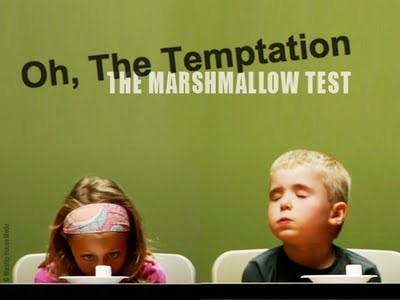
The Marshmallow experiment was conducted in 1972 at Stanford University’s Bing Nursery School, where psychologist Walter Mischel and his graduate students gave one chocolate to each student. They told the students that if they waited longer, say for 20 minutes to eat their chocolate, they world get a larger reward of two marshmallows. Years later, Mischel and his team followed up with the Bing preschoolers and found that children who had waited for the reward of two marshmallows generally fared better in life. They fared well in their higher studies as well as careers. These students also had a lower body-mass index (BMI), 30 years after their initial Marshmallow Test. The researchers working with Walter Mischel discovered that parents of the students who delayed eating the chocolate reported that their children were more competent. The parents were not aware of the chocolate experiment which had taken place in school.
Marshmallow experiment is measured to be one of the most successful behavioral experiments. Patience allows you time for tactical thinking and completely evaluating a situation. It’s one of the most important personality traits.
I give hereby an example of Colonel Harland Sanders, who founded fast food chicken restaurant chain known as Kentucky Fried Chicken (also known as KFC) and later acting as the company’s brand ambassador and symbol, was fired from many jobs before he started KFC. He began cooking chicken in his roadside Shell Service Station in 1930, when he was 40 years old and that was the time of the Great Depression. His gas station didn’t actually have a restaurant, so he served diners in his attached personal living quarters.
Over the next 10 years, he perfected his “Secret Recipe” and pressure fryer cooking method for his famous fried chickens which were distributed to bigger locations. His chicken was even praised in the media by food critic Duncan Hines – an American pioneer of restaurant ratings for travellers. However, as the interstate system came in which the Interstate Defence Highway Act of 1956 instructed one in five miles road of the Interstate System to straighten, so airplanes could land in emergencies. This hampered Kentucky town where Colonel Sander’s restaurant was located in the 1950s, it took away important road traffic, and Colonel was forced to close his business and retire. He was broke and worried about how he was going to survive off his meagre $105 monthly pension check, he set out to find restaurants who would franchise his secret recipe; all he wanted a nickel for each piece of chicken sold. He drove around, sleeping in his car, and his recipe was rejected more than 1,000 times before finally finding his first partner.
Sanders had recognized the potential of the restaurant franchising concept, and the first KFC franchise opened in South Salt Lake, Utah in 1952. When his original restaurant closed, he devoted himself full-time to franchising his fried chicken throughout the country.
The company’s rapid expansion across the United States and overseas became overwhelming for Sanders. In 1964, then 73 years old, he sold the company to a group of investors led by John Y. Browns and Jack C. Massey for $2 million. However, he retained control of operations in Canada, and he became a salaried brand ambassador for Kentucky Fried Chicken. In his later years, he became highly critical of the food served by KFC restaurants, as he believed they had cut costs and allowed quality to decline. Sanders personified what patience is.
With patience things fall into place, presenting a clearer strategic view of what’s taking place. It’s better to wait until things calm down, putting you in a better position to make strategic decisions. To say patience is a virtue is an understatement. It’s really more of a skill. It needs constant nurturing. I would put it this way that patience is the state of being that transpires between experience and reaction. Whether you’re trying to be patient with yourself or others, it seems to always involve the experience of dealing with delays and obstacles.
The marshmallow test was considered more or less an indicator of self-control. The original study inspired a surge in research into how character traits could influence educational outcomes (thinking, grit and mindset). They also influenced schools to teach delaying gratification as part of “character education” programs.
Today most of us want instant gratification – it is the need to experience fulfilment without any sort of delay or wait. This has led to a whole host of things including online pornography, gambling, drugs, alcohol and money laundering. When it comes to gambling in particular, there is a plethora of new online casinos and apps available on mobile phones that are luring in an ever-growing amount of players by promising great fun and easy wins.
Retailers, entertainment channels are reaping the benefits of society’s growing impatience. Walmart and eBay have challenged Amazon in a battle of which company can deliver the fastest, because consumer habits have made it clear that they will pay big bucks to avoid the wait. Even when you visit holy places, you pay money and skip the line to see the God at once. You ask for anything food, flowers, and furniture, and clean laundry, instant answers on Google, groceries and even a partner. Apps like Tinder, Grindr and JSwipe give you millions of romantic candidates’ right at your fingertips, waiting for you to filter them by location, sexuality, religion, hobbies and how desperate they are for a partner.
Do we need Marshmallow experiment at every stage of our lives?













































